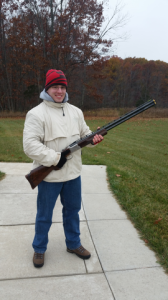
As a shooting sports educational center, the John A. Halter Shooting Center’s firearms rules differ from those on Hillsdale College’s main campus. The college itself is not the most lenient school in Michigan when it comes to carrying guns on campus.
Hillsdale College frequently holds seminars on the Second Amendment, the part of the Constitution providing the right to bear arms. The shooting center allows visitors, students, faculty, and staff to put that right to use.
So long as those who come to shoot follow the four cardinal rules — keep the gun pointed in a safe direction, keep the gun unloaded until ready to shoot, keep your finger off the trigger until ready to shoot, and keep attentive to what’s behind the backstop — they may have possession of a firearm, Director of Security Bill Whorley said.
State law prohibits weapons inside dormitories and classrooms, except for instructional use. Beyond that, the state’s rules allow for open and concealed carry on college and university campuses so long as the person in possession of the firearm has a concealed carry weapons permit. Law enforcement officials may carry anywhere.
Several faculty and staff members conceal carry on Hillsdale’s campus, Chief Administrative Officer Rich Péwé said. Before teaching a class, however, professors must remove a concealed carry gun and leave it in their offices.
“If there were an event, you don’t have to rely on law enforcement,” Péwé said. “There’d be individuals who could defend the college if needed. If there’s no reason the college thinks they shouldn’t have concealed carry, then we allow it.”
The college, however, does not require any employee carry a gun.
Originally, in-class sessions of firearms courses offered by Hillsdale were held in Lane Hall. The school moved the lessons to the shooting center because part of the course involved instructors bringing guns to display in class.
“It’s unnerving if there’s a civilian walking with gun cases into a school building,” Whorley said.
As a private institution, Hillsdale can place more restrictions on carrying guns than the state. Péwé said the school’s policy is practical.
Whorley agreed: “It keeps a good educational environment.”
The college administration prefers to know if an individual is carrying. For college employees to possess a gun on campus, they must notify campus security.
Students who own guns may bring them to college. Since it is illegal to have them in a residence hall or classroom, however, students living on school property must store them at the security office
Security locks up the weapons, and students check in and check out their property when they wish to use it.
“It’s accountability for us,” Whorley said. “We have some students with valuable firearms, and we want to make sure we do our best to protect those.”
As for open carry, Péwé said the only instance he could see it permissible would be if the college hired a law enforcement member.
“There’s certain hoops you have to jump through for open carry,” Péwé said.
The policies at most other higher education institutions in Michigan are somewhat more strict than Hillsdale’s.
According to Whorley, many similarly sized private colleges, such as Adrian College, prohibit firearms on campus.
As for public institutions, Corporation Counsel for Michigan Gun Owners Inc. Jim Makowski told the Collegian there are two classes.
The first tier colleges include those required by the state constitution to be governed by a board of regents or trustees, such as the University of Michigan, Michigan State University, and Wayne State University. Members of their boards argue they can implement stricter restrictions than those imposed by the state, including no open carry.
U of M and WSU prohibit firearms on campus. Some common exceptions, however, include police officers, employees and visitors, and those using the weapon for educational or recreational use, as approved by the university.
MSU has some of the most lenient restrictions in the state. People with a license may conceal carry on campus, permission not necessitated.
The second class of public institutions isn’t governed by a board. Makowski said these colleges cannot restrict a licensed individual from carrying on campus outside of classrooms and dorms. Most, however, use the state code of conduct to prohibit student possession of guns while on campus.
Many of these institutions write into their rules that carrying firearms is prohibited while on their property. Although these regulations are not formal ordinances, individuals who choose to carry can still have law enforcement escort them off campus.
“Just because schools do it doesn’t mean it’s legal, only that it hasn’t been challenged,” Makowski said.
Makowski said regulations of firearms on campus do not necessarily promote the school’s safety.
“There’s not a law on the books in place that would stop someone with bad intent from coming to a school and shooting,” Makowski said. “Murder is already against the law, last time I checked. Putting a law out there saying you can’t carry a gun on campus is just going to take away the ability of law-abiding citizens to defend themselves.”
Péwé and Whorley said the policies on Hillsdale’s campus aim to create a safe environment for its students.
“I don’t necessarily want anyone to think that Hillsdale is a gun-free college,” Péwé said.

